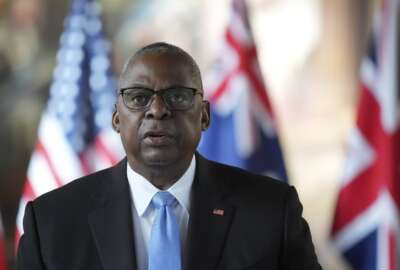Navy breaks ground on second-largest federal solar project
The Navy has signed a deal to start funneling green energy to its largest base. Instead of costing money, the project will save money, Navy and industry officials...
wfedstaff | June 4, 2015 4:35 pm
The Navy broke ground this week on what will become the service’s single largest solar energy project and one of the largest in the federal government.
The new solar array at China Lake Naval Air Weapons Station in California’s Mojave Desert will cover 118 acres of land, something China Lake has in abundance, as the Navy’s largest installation by land area. It will produce 13.8 megawatts of power, bringing China Lake in slightly behind the military’s largest solar installation at Nevada’s Nellis Air Force Base, which generates 14.2 megawatts.
The Navy won’t incur any upfront cost for the construction of the 31,680-panel solar array. Instead, under a 20-year agreement with San Jose, Calif.-based SunPower Inc., the Navy has agreed to purchase the power generated by the solar installation in exchange for use of the land.
The agreement is the first 20-year Power Purchase Agreement (PPA) signed by a federal agency to date, SunPower officials said.
“The government didn’t have to put an appropriation line item in their budget to pay for this system, and they don’t have to maintain it. They can focus on their core mission,” Karen Butterfield, SunPower’s director of federal accounts said in an interview. “We can focus on providing energy.”
“There was an extraordinary level of effort that went into market research, industry partnering, preparing complicated acquisition documentation, navigating complicated regulations and incentives, and doing technical analysis,” said Capt. Clifford Maurer, the commanding officer of Naval Facilities Engineering Command Southwest.”
The Army also has committed to using a variety of contracts including Power Purchase Agreements to buy renewable energy.
The goal is for the Army to obtain 25 percent of its energy from renewable resources in the next 13 years. It already is working on more than 20 renewable energy projects, many of which will serve as testbeds for a new task force effort to meet their goal. The task force also will work on several new multiple-award contracts in the coming year to build these renewable projects, including energy savings performance contracts, of which the Army has more than 100 in place now to improve the energy efficiency of existing building, enhance use leasing, cooperative agreements and power purchase agreements.
As for the Navy, officials said the project will supply approximately 30 percent of China Lake’s electricity demand over the life of the 20-year contract. A third-party financier, MetLife, will own the solar arrays together with SunPower, and the private sector entities will operate and maintain the equipment.
The Navy’s only obligation is to purchase the energy the solar project produces over the next 20 years, an arrangement that both SunPower and the government assert is a good bargain. The Navy expects the arrangement to shave $13 million from its electric bill over the life of the system.
“The rate per kilowatt hour is lower than the rate they’re currently paying the local utility, and the rate is fixed for 20 years,” Butterfield said. “They don’t have to wonder what the rate is going to be in five or 10 years. And our belief is that utility rates will escalate, as they have for the past 10 or 20 years, and the government will save even more than we predict.”
At the end of the contract, SunPower is obligated to remove its equipment from Navy property, Butterfield said.
RELATED STORIES:
Air Force reducing energy consumption in air, on bases
Obama commits $2B to energy upgrades to federal buildings
Army to trade land for renewable energy
Army to meet renewable energy goals through predictability
Copyright © 2024 Federal News Network. All rights reserved. This website is not intended for users located within the European Economic Area.
Jared Serbu is deputy editor of Federal News Network and reports on the Defense Department’s contracting, legislative, workforce and IT issues.
Follow @jserbuWFED






